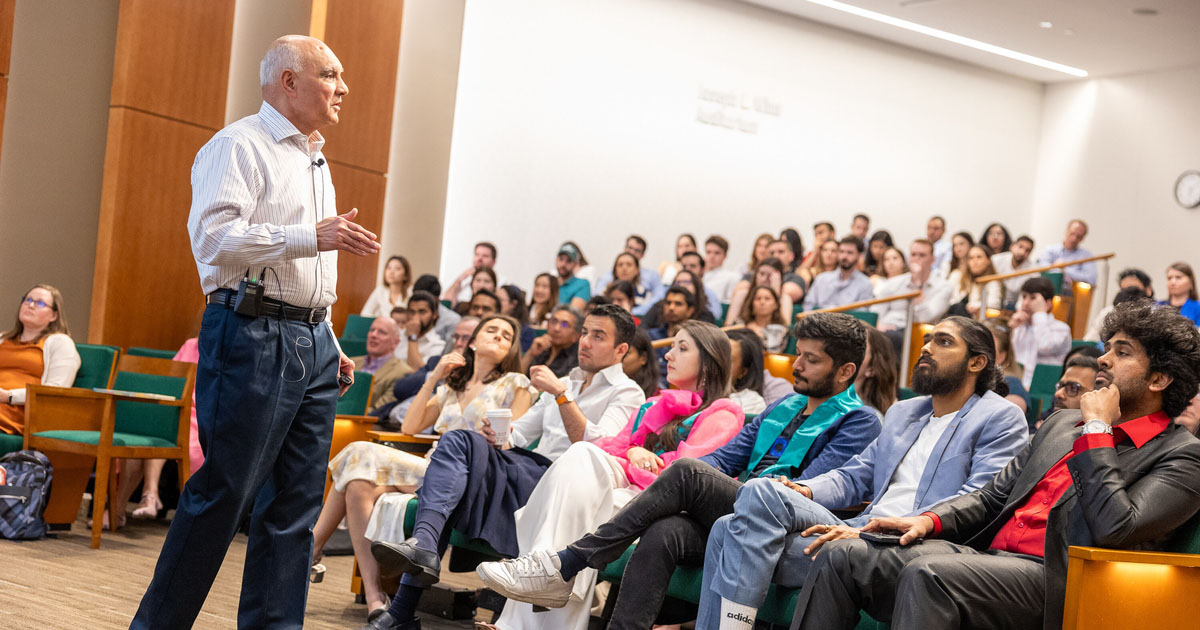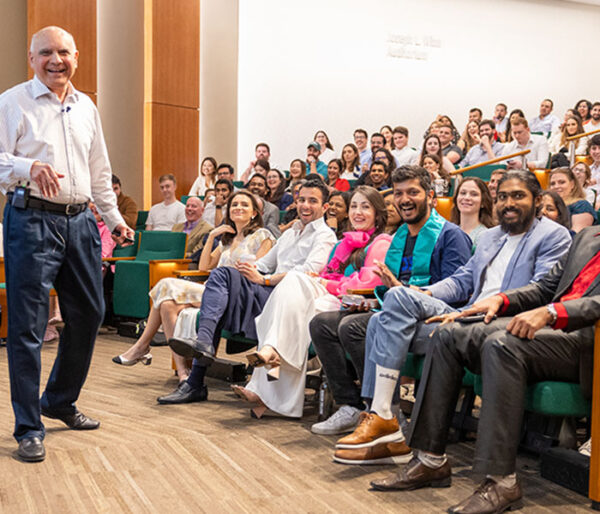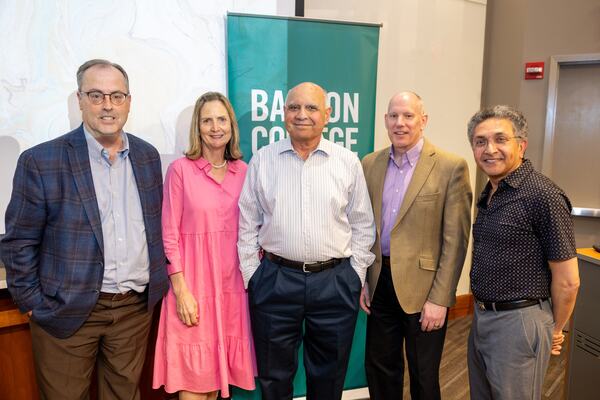Navigating the Realm of Possibility: Inspiring Advice from the Last Lecture

Babson Professor of Marketing Anirudh Dhebar had already won the Thomas Kennedy Award for Teaching Excellence five times before Tuesday night, when, thanks to the graduate Class of 2024, he accepted the award for a sixth time.
“As you leave Babson, as you graduate and leave for your next venture or adventure, you are wandering toward possibility. And that possibility is going to be fragile,” Dhebar said, paraphrasing entrepreneur and blogger Seth Godin who wrote: “Possibility looms around every corner if we’re willing to bring resilience and iteration to the dance as well.”
“Promise me this,” Dhebar said to graduate students inside a packed Joseph L. Winn Auditorium as he gave the traditional Last Lecture, “after Saturday, once you graduate and move on through your life, that you will bring resilience and iteration to the dance.”
Seek Opportunities, Not Just a Job
Dhebar led his classic Beatles sing-along with the crowd, which included family and well-wishers. He also shared a list packed with small but powerful bits of advice.
“Don’t be a Nowhere Man,” Dhebar advised after leading the sing-along to the Beatles song of the same name. “Seek opportunities, don’t just seek a job.”

“Develop a fisheye lens. A fish has a much wider perspective,” he said, adding that periscopes have an advantage over telescopes because they can see around corners. “Don’t just go straight. Look around corners.”
“Spend as little time as possible regretting yesterday, and don’t waste time being anxious about tomorrow. Regret and anxiety are not useful. Instead, focus on moving forward. Be prepared for any serendipity that changes your trajectory,” Dhebar said. “And know that everything you do and the way you do everything sends a message.”
One bit of advice triggered a big laugh from the crowd. As Dhebar urged students to break from the norm, he asked the audience why they should never take photos standing up. Nic Czarnecki, the Babson photographer covering the event, quickly dipped to one knee.
“Ah, he knows” laughed Dhebar. “Unless you are of unusual height, most photographs are the same. You want to bring a different perspective to bear.”
Avoid Buzzwords
Dhebar’s Last Lecture came after four of his colleagues shared their parting advice.
Jay Rao P’21 ’24, professor of operations management, suggested that the graduates embrace true entrepreneurial leadership by avoiding easy buzzwords and mediocracy.
“Mediocrity is toxic,” Rao said. “And how do you identify mediocre MBAs? You will identify mediocre MBAs because they will be spewing buzzwords.”
Many lecturers ended up incorporating a very vocal baby who was in the audience into their lectures. Richard Goulding, an associate professor of practice in operations and information management, was urging graduates to think about AI more expansively when the baby boy let out a high-pitched squeal.
“I agree,” enthused Goulding, the winner of last year’s Kennedy Award. “I think what this means is that the realm of what’s possible is expanding at a rate that we really can’t comprehend. But an entrepreneur is someone that serves as an apprentice for a lifetime, and who sees things that other people don’t see.”

Brigitte Muehlmann, professor of accounting and law, used famous psychologists from her home country of Austria to urge graduates to keep their focus on purpose instead of pleasure or profit.
She said Sigmund Freud argued humans exist for pleasure; Alfred Adler argued humans exist for profit; and Viktor Frankl argued that humans exist for purpose.
“Go out there and be really, really successful, but do it the right way,” Muehlmann said, highlighting Frankl’s argument for a life of purpose. “I look forward to hearing your stories.”
Scott Taylor, professor of organizational behavior and the Arthur M. Blank Endowed Chair for Values-Based Leadership, spoke of the importance of relationships, especially when it comes to leadership. He told a story of his son’s first swim lessons. The coach was covered in tattoos, yet his son didn’t even notice them.
“He didn’t notice anything about this coach other than how he was being treated, and I think there’s a powerful lesson there,” Taylor said. “Leadership is a relational construct, and relationships require practice forever.
“The day will come when you and I will be stripped of all our successes, our titles, our positions, and our accolades. What will endure forever is our relationships. So, I hope that they continue to grow, I hope you go out and have an impact and continue to focus on the relationships you have with others,” Taylor said. “Because at the end of the day, that’s what really, really matters.”




